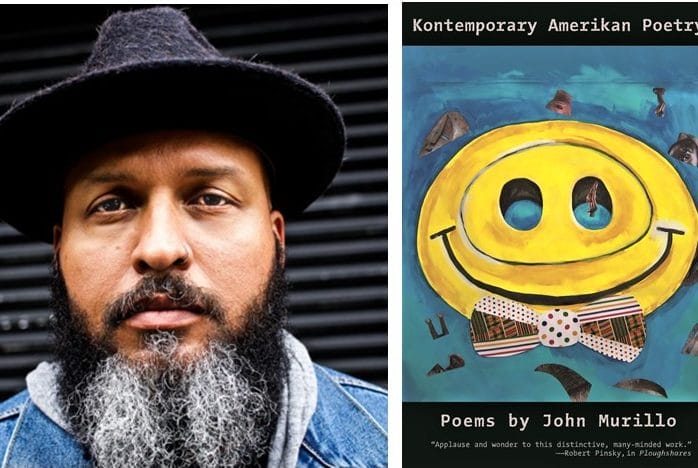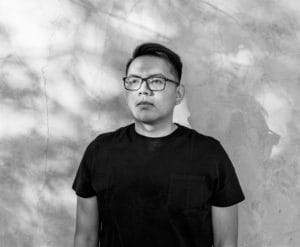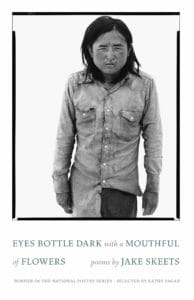John Murillo’s Kontemporary Amerikan Poetry Named 2021 Kingsley Tufts Poetry Award Winner

Jake Skeets’s Eyes Bottle Dark with a Mouthful of Flowers Named 2021 Kate Tufts Discovery Award Winner
***
For their powerful explorations of identity, desire, and violence in the modern world, John Murillo’s Kontemporary Amerikan Poetry (Four Way Books) has been selected as the recipient of the 2021 Kingsley Tufts Poetry Award; and Jake Skeets’s Eyes Bottle Dark with a Mouthful of Flowers (Milkweed Editions) has been selected as the recipient of the 2021 Kate Tufts Discovery Award.
Chosen annually, the Kingsley award—which is one of the largest annual awards in contemporary poetry—provides $100,000 for a book by a mid-career poet; the Discovery award honors a book from a poet of promise with $10,000.
The selection of this year’s winners was announced during a traditional call-the-winner event hosted every spring by Claremont Graduate University.

A Virtual Format
Due to quarantine restrictions, the event, which is normally held in-person at the home of CGU President Len Jessup, was shifted to an online format. Attendees watched online as the two winners were called and notified about their selection.
Finalist Judging Chair Timothy Donnelly, who won the Kingsley in 2012 for The Cloud Corporation, gave the good news to this year’s winners.
Donnelly praised Murillo’s Kontemporary Amerikan Poetry (a powerful collection that examines the brutal legacy of racial injustice) for making traditional poetic forms like blank verse “feel as relevant for us today as Frost did for his time—and we applaud that nothing about the book feels rushed. It is a deeply considered, impeccably selective, resonant, radiant book.”
Donnelly singled out Murillo’s poem “On Confessionalism” and the tragic sonnet sequence “Delores, Maybe” for their perfect execution. “On Prosody” he called “a tour-de-force that takes Robert Frost’s observation that ‘The best place to get the abstract sound of sense is from voices behind a door’ to places he probably didn’t foresee.”
Murillo is an assistant professor of English at Wesleyan University and a past recipient of a Pushcart Prize and the J. Howard and Barbara MJ Wood Prize from the Poetry Foundation as well as fellowships from the National Endowment for the Arts and the Bread Loaf Writers Conference, among others.
In addition to Donnelly, this year’s judging committee included poets Meghan O’Rourke, Luis Rodriguez, Prageeta Sharma, and Patricia Smith (winner of the Kingsley in 2018 for Incendiary Art).

For the Kate Tufts Discovery Award, the judges chose Skeets’s collection because, as Donnelly told him, “we are in awe of this book of yours. Knocked flat. We are humbled by the care and the candor with which it bears witness to what it means to come of age in the ‘Indian Capital of the World.’ The hardships, the hazards, the resilience and the refusal not to find beauty wherever it can still be found.”
A recipient of a 92Y Discovery Prize, a Mellon Projecting All Voices Fellowship, an American Book Award, and a Whiting Award, Skeets describes his prize-winning poetry collection as “a project of reclamation for me, and for this picture, and the history that went behind it.”
The picture he referred to is on the book’s cover, a photo of his late uncle, Benson, taken by Richard Avedon in 1979 as part of a series of portraits about the American West.
The circumstances behind the photo—and the exchanges Avedon had with Benson about it—were lost to the family when, a year after the photo was taken, Benson was stabbed to death. Eyes Bottle Dark with a Mouthful of Flowers is Skeets’s poignant response to that loss. Read here for more about Skeets and his late uncle’s photo on Lithub.

Indie Publishers and a Regional Angle
This year’s awards are notable for their attention on small independent presses—all of this year’s finalists (including the winners) are published by the indies—and for an unexpectedly regional angle that ties them with Claremont and the Southwest.
Skeets is from the Navajo Nation and teaches at Diné College in Tsaile, Arizona, while Murillo, a Brooklyn resident, grew up not far from the university in the city of Ontario, attended high school there and in Alta Loma, and has family in Pomona.
“It’s striking and, I think, significant that both of this year’s winners are connected with our region in some way,” said Lori Anne Ferrell, dean of CGU’s School of the Arts & Humanities and director of the awards. “They might be regional in terms of their backgrounds, but, still, their poetry speaks boldly and poignantly about the human condition in ways that transcend particular places or individual experience.”
Celebrating the Finalists
The event’s organizers introduced something new this year: Even though much of the hour-long event was devoted to this year’s winners, much time was given to presenting the work of this year’s finalists in both categories.
Several of the Tufts judges read selections and discussed each finalist’s particular gifts and strengths.
Rourke read from Kingsley finalist Joyelle McSweeney’s “Sestina” and praised her for “doing things with language that other poets can’t do,” while Rodriguez read from Discovery finalist Su Hwang’s Bodega and said she was gifted with the “art to turn the mundane into the powerfully poetic.”
Smith celebrated Discovery finalist Tommye Blount for “his unflinching willingness to pull us into a world most of us would rather turn away from” and said of Kingsley finalist T’ai Freedom Ford that her “muscled music is very evident here. She refuses to settle for lines that only live on the page; she bursts forth on every page of this book.”
For Ferrell, the quarantine tried—and failed—to dampen that deep sense of community and spirit that has always characterized the awards.
“How good it is to see everybody, and next year, hopefully, we’ll be together in Claremont again,” she told the zoom audience as she looks to the future. “We’ve been able to stay close and celebrate this special event even when remote, and to me that’s proof of the power of poetry, and that’s all we need to say.”
****